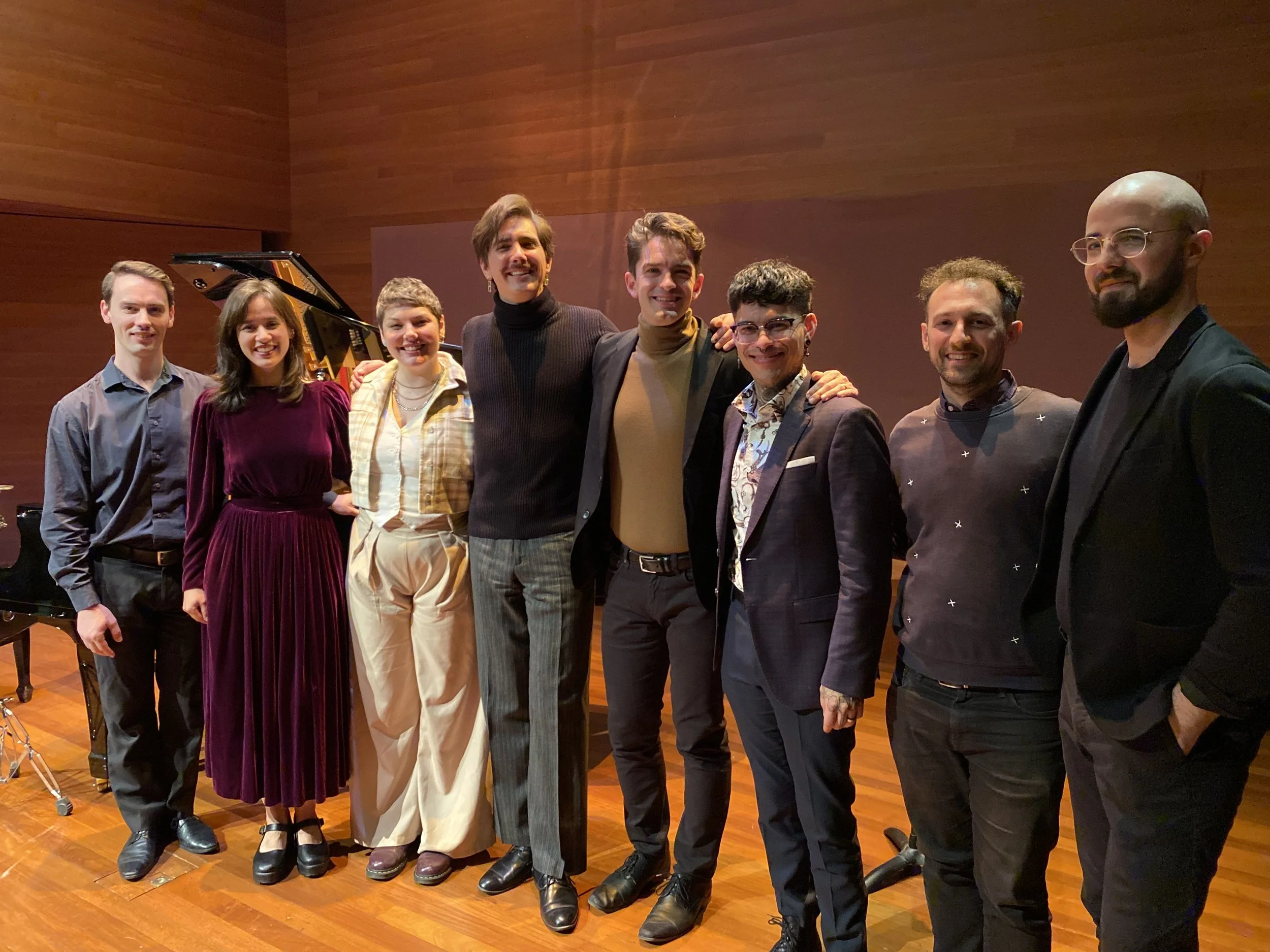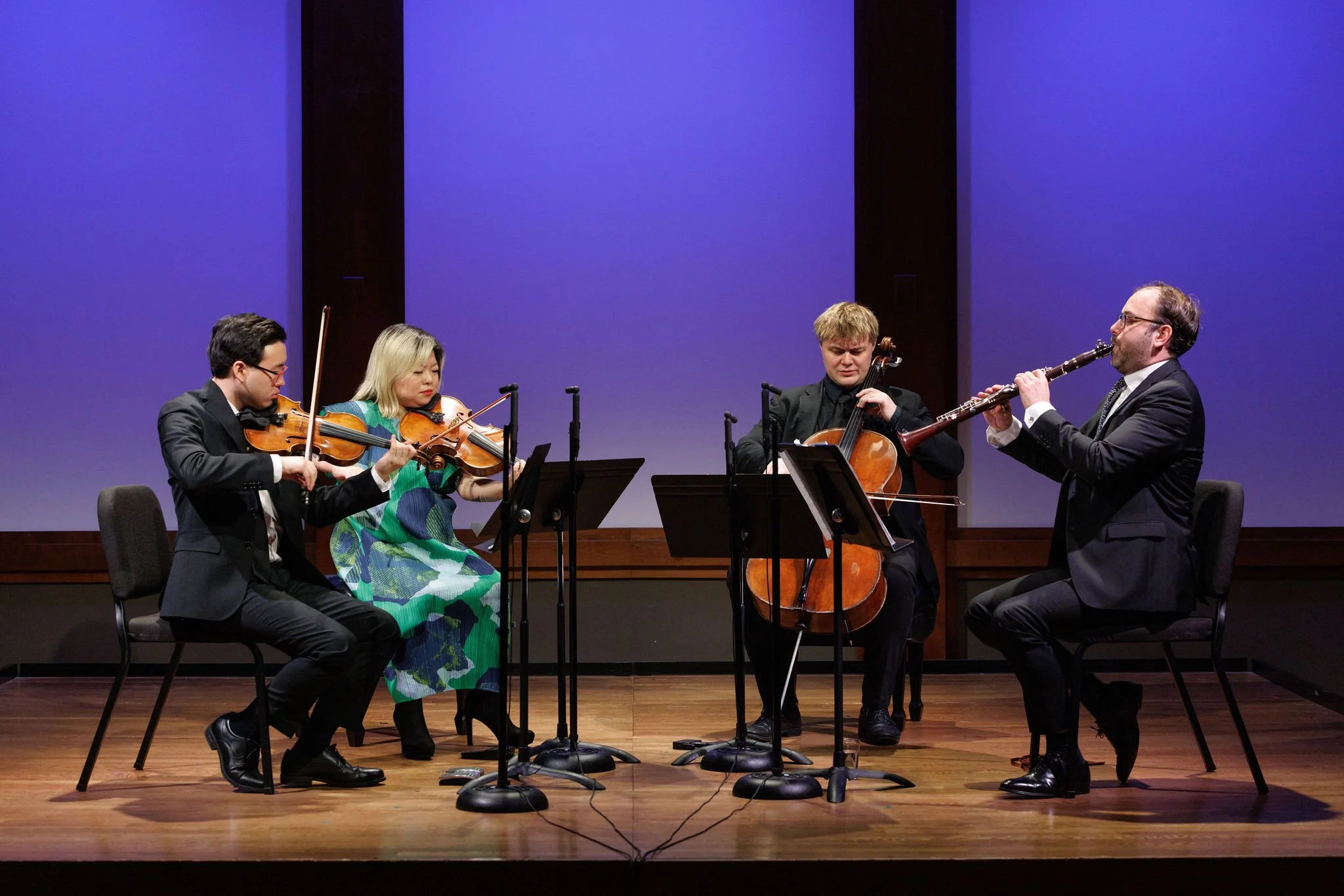REVIEW: NYFOS Makes Space For New Music
by David Wolfson
November 3, 2024
An art song recital is the last place remaining for an audience to hear an unamplified singer in an intimate setting; as such, it always has a whiff of the 19th century about it. But NYFOS Next, the venerable New York Festival of Song’s new music series, showed in their recent program A Space to Make that the ancient form is alive and very much kicking in the hands of the current generation of practitioners.
Series curator Nathaniel LaNasa (who also served excellently as the program’s pianist) did a remarkable job of putting together a thematically coherent, well-paced and musically varied program, including several premieres, on a somewhat rarified theme I will summarize as “spaces humans inhabit.” If some of the pieces were more successful than others, that is only to be expected. The performers (Robin Steitz, soprano; Theo Hayes, mezzo-soprano; and Gregory Feldmann, baritone) are all terrific singers, but the particular alchemy of matching song and performer can be hit-or-miss. However, the pieces that worked best worked very well indeed.
Hayes was given the program’s opener, Joseph N. Rubinstein’s Uncoil (on a text by Rita Mae Reese), and Isabella Gellis’ Montreal Songs (on traditional texts). Hayes has a huge, round, rich voice, and is very expressive musically, and I very much want to hear them in front of an orchestra. However, I don’t think this is the ideal venue for them; their English words were mostly unintelligible, and their affect was mostly flat in the French and Yiddish sections of the Gellis, not helped by the fact that the piece was not memorized. Montreal Songs as a piece is not without merit, though, with interestingly dissonant and random piano writing against the folk-like vocal melodies.
Feldmann’s major assignment was the premiere of Iván Enrique Rodríguez’ Mother of Exiles, a contemporary exegesis of Emma Lazarus’ “The New Colossus” (you know, from the Statue of Liberty) mashed up with a quote from the Star-Spangled Banner and a spoken epilogue of words by Eleanor Roosevelt. This is an ambitious work, but some of the musical choices undercut the communicative intent. The piano writing is busily full of gnarly, knotted lines and clusters; the vocal line is often slow and melismatic. For most listeners this will make the meaning of the text hard to track, even when individual words are intelligible. Feldmann has a warm, charismatic stage presence, and sold the piece well; certain moments were memorably effective, such as the slight, meaningful pause between the words “golden” and “door.”
His performance of Matthew Ricketts’ Everything is New (on a text by Tom Coote, adapted by the composer), though, was all around one of the most compelling moments of the evening. The text is an oral history; Ricketts’ mostly-tonal setting of it was direct and unflashy, with excellent understanding of how to set text so it still sounds like language, and Feldmann took that ball and ran with it, drawing the audience into a vivid piece of portraiture.
Steitz was matched with some material that suited her perfectly and some that did not. Jack Perla’s The Peace of Wild Things (text by Wendell Berry) was saccharine and unmemorable; his Down to the Twigs and Seeds (James Fenton), a “cabaret” song for soprano after the manner of William Bolcom, was witty and well-constructed enough, but Steitz seemed stiff and uncomfortable with it.
This was surprising, because she had seemed so at ease in Hannah Kendall’s Rosalind (Sabrina Mahfouz), a piece about gender spaces in which she shared the stage with Feldmann, each of them portraying aspects of the same character. This was the only piece on the program that strayed from classical vocal technique, featuring whispers, echoed consonants, shouted or spoken interjections, and humming. Steitz was also called upon to wind a player-piano type roll through a music box and play harmonica at various points. By and large it all worked very well, with the sonic palette used to reinforce meaning and drama. The most effective of the five songs was the one the two performers sang in unison while facing each other.
Steitz not only seemed at ease but dazzled in the late Sarah Gibson’s Unread Messages, written with her piano duo partner Thomas Kotcheff. (LaNasa was joined by fellow pianist Eric Sedgwick for the four-hand accompaniment of the piece.) The texts are, well, texts—fragmentary exclamations, inquiries and wishes. Gibson and Kotcheff wove them into a sprawling but cohesive landscape that left plenty of room for interpretation, and Steitz filled it with achingly human desires, fears and ambitions, by turns funny and heartbreaking. This piece, this performance made me absolutely giddy with joy.
David Wolfson holds a PhD in composition from Rutgers University, and has taught at Rutgers University, Montclair State University and Hunter College. He is enjoying an eclectic career, having composed opera, musical theatre, touring children’s musicals, and incidental music for plays; choral music, band music, orchestral music, chamber music, art songs, and music for solo piano; comedy songs, cabaret songs and one memorable score for an amusement park big-headed-costumed-character show. You can find more information here.
***
Next from NYFOS:






